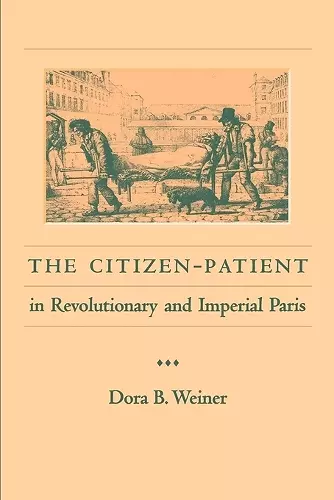The Citizen-Patient in Revolutionary and Imperial Paris
Format:Paperback
Publisher:Johns Hopkins University Press
Published:1st Jan '02
Currently unavailable, and unfortunately no date known when it will be back

In The Citizen-Patient in Revolutionary and Imperial Paris, Dora B. Weiner examines the experiences of the sick and handicapped indigent men, women, and children in Paris during the French Revolution and Empire. Weiner argues that significant groups of Revolutionary physicians and reformers interpreted equality to include every citizen's right to health care. These reformers faced political, religious, and professional opposition, and daunting problems of funding. And they needed the participation of the poor as "citizen-patients," patients with both rights and duties, who acted as responsible partners in the pursuit and maintenance of public and personal health. Weiner surveys the 20,000 patients institutionalized in twenty Paris hospitals and hospices and explains how the Revolution changed the status and work of nurses, pharmacists, midwives, and students, as well as doctors. Clinical teaching, professional specialization, and approaches to public health were all affected. Weiner emphasizes health care for children, deaf and blind people, and mentally ill patients and underscores the role of women as administrators and dispensers of hospital care.
Written with panache and conviction... A delight to read, packed full of valuable data, enlivened by a host of illustrations. Social History of Medicine Weiner's book is a mine of gratifyingly concrete, often fascinating information... rich and compelling details. Bulletin of the History of Medicine This is history of the highest quality; it shows the hard work of years of archival research as well as familiarity with the interpretive literature in a variety of intersecting fields. Journal of Social History A goldmine of valuable information and interesting insight. Medical History
ISBN: 9780801870026
Dimensions: unknown
Weight: 726g
446 pages